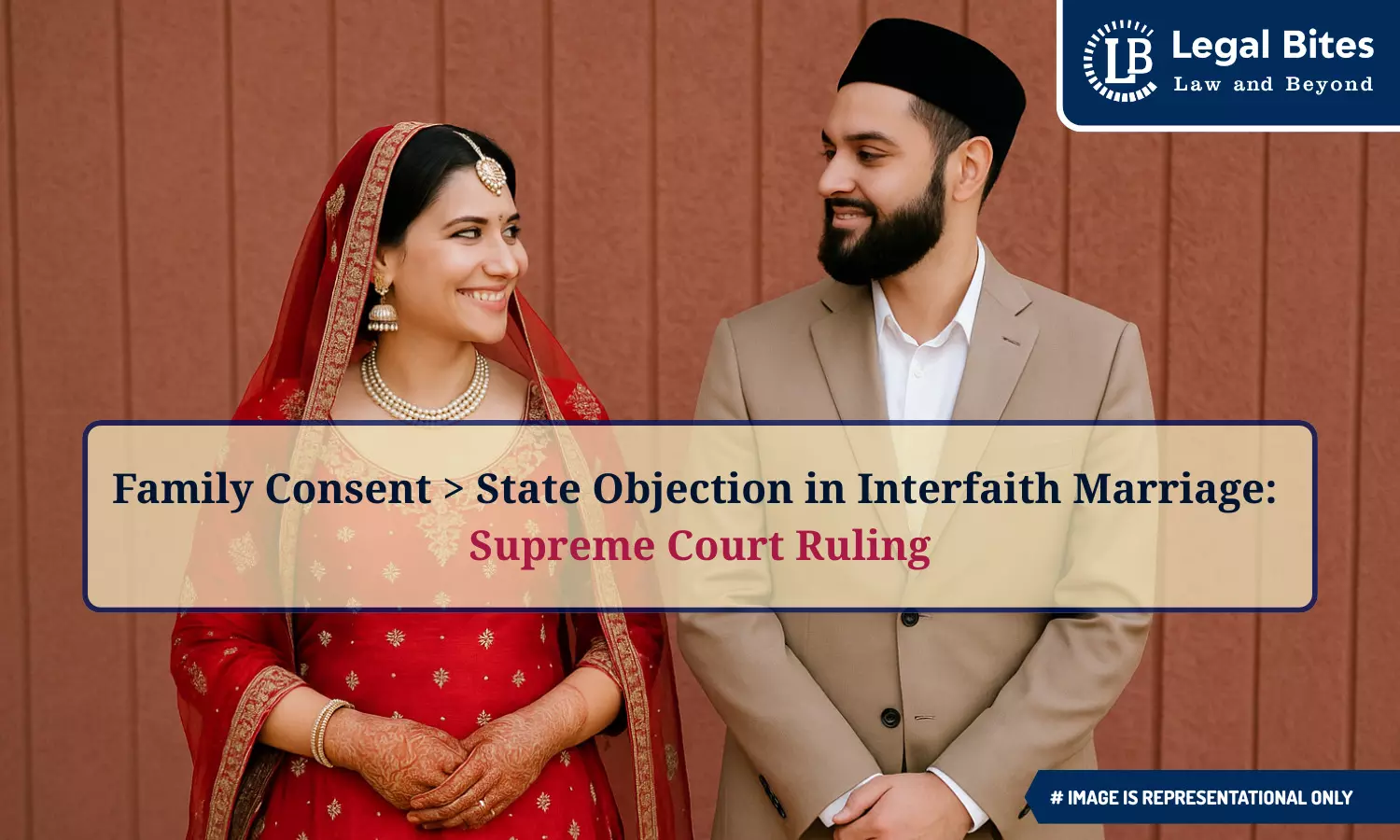When Families Consent, Can the State Still Object to an Inter-Faith Marriage?
The case affirms constitutional morality and autonomy, holding that the State can't oppose a consensual inter-faith marriage without clear proof of coercion.

Inter-faith marriages often invite scrutiny in India—socially, culturally, and increasingly, legally. Despite constitutional protections for individual liberty and freedom of conscience, the intersection of personal relationships and state authority continues to provoke judicial intervention. A recent ruling by the Supreme Court in Aman Siddiqui alias Aman Chaudhary alias Raja v. State of Uttarakhand [arising out of SLP (Crl.) No. 4600 of 2025] reignites the debate over how far the State...
Inter-faith marriages often invite scrutiny in India—socially, culturally, and increasingly, legally. Despite constitutional protections for individual liberty and freedom of conscience, the intersection of personal relationships and state authority continues to provoke judicial intervention. A recent ruling by the Supreme Court in Aman Siddiqui alias Aman Chaudhary alias Raja v. State of Uttarakhand [arising out of SLP (Crl.) No. 4600 of 2025] reignites the debate over how far the State can intervene in consensual inter-faith marriages, especially when solemnised with family approval.
This article examines the factual background, legal issues, statutory framework, and judicial reasoning underlying the judgment, highlighting the significance of this decision in reaffirming personal liberty amid rising concerns over the misuse of anti-conversion laws.
Background: The Rise of Anti-Conversion Laws
Several Indian states, including Uttar Pradesh, Uttarakhand, and Madhya Pradesh, have enacted "freedom of religion" laws aimed at preventing forced religious conversions. While these laws purport to protect religious freedom, critics argue they are frequently misused to criminalise inter-faith marriages under the pretext of “love jihad.”
The Uttarakhand Freedom of Religion Act, 2018, penalises conversions done by force, inducement, or misrepresentation. Section 3 prohibits conversion without prior declaration before the District Magistrate, and Section 5 criminalises contraventions of this requirement.
The Case: Aman Siddiqui alias Aman Chaudhary v. State of Uttarakhand
Facts
- Aman Siddiqui, also known as Aman Chaudhary, was arrested on 12 December 2024 under FIR No. 609/2024 at Police Station Rudrapur, District Udham Singh Nagar.
- He was charged under Sections 3 and 5 of the Uttarakhand Freedom of Religion Act, 2018, and Sections 318(4) and 319 of the Bharatiya Nyaya Sanhita, 2023.
- The complaint was triggered after Siddiqui married a woman of a different faith.
- Crucially, the marriage was an arranged one, with the knowledge and consent of both families.
- However, objections from certain individuals and organisations led to the registration of the FIR.
- His application for regular bail was rejected by the High Court of Uttarakhand on 28 February 2025.
- The matter was escalated to the Supreme Court, which granted leave and heard the appeal.
Issues
- Can the state proceed with criminal action under anti-conversion laws when the inter-faith marriage has occurred with the informed consent of both parties and their families?
- Does familial consent negate the presumption of coercion or inducement required to attract provisions under the Freedom of Religion Act?
- Should such cases be treated as criminal violations absent evidence of fraud, coercion, or misrepresentation?
Supreme Court’s Observations
The Supreme Court, comprising Justices B.V. Nagarathna and Satish Chandra Sharma, made the following significant observations:
1. No State Objection When Families Consent
The bench observed that the respondent - State, has no grounds to object to the appellant and his wife living together, as their marriage was solemnised with the full consent of both their families.
It sets a strong precedent against unwarranted state interference in personal decisions, especially when supported by family members.
2. Marriage is Valid and Voluntary
The Court noted that the marriage was arranged, consensual, and celebrated with full knowledge of religious identities. Thus, no element of fraud, coercion, or inducement—essential under the Uttarakhand Freedom of Religion Act, 2018 — was present.
3. State Cannot Supplant Familial Consent
The judgment implicitly reiterates that the state cannot override familial and individual autonomy unless there is clear evidence of unlawful activity. Religious difference alone is not a crime.
4. Bail Granted Based on Absence of Prima Facie Offence
Despite the filing of the charge sheet, the Court held that the allegations did not warrant continued custody, particularly when the intent behind the FIR appeared motivated by social or communal objections rather than legal violations.
Legal Analysis
A. Section 3 and 5 of the Uttarakhand Freedom of Religion Act, 2018
These sections require pre-conversion declarations and prohibit conversion through wrongful means. However, the Act does not criminalise inter-faith marriage per se, unless accompanied by illicit inducement or coercion.
In Aman Siddiqui, the state failed to demonstrate:
- Any material benefit offered in exchange for conversion;
- Any mental or physical pressure;
- Any religious conversion even occurred.
The FIR seemed to be based solely on the inter-faith nature of the marriage, which is neither prohibited by law nor the Constitution.
B. Constitutional Principles
The judgment aligns with Article 21 (Right to Life and Personal Liberty) and Article 25 (Freedom of Religion) of the Constitution. The right to choose a life partner is an essential part of personal liberty. The Court’s approach resonates with prior decisions like:
- Shafin Jahan v. Asokan K.M., (2018) 16 SCC 368: The Supreme Court upheld the right of an adult woman to choose her partner, stating that the courts should not interfere in such decisions.
- Lata Singh v. State of UP, (2006) 5 SCC 475: Inter-caste and inter-religious marriages are in the national interest.
Social Context and Implications
The case reveals how state machinery may be weaponised to target consensual inter-faith unions, particularly in regions where such alliances provoke community or political ire.
The Court’s ruling is timely and crucial, offering:
- Judicial clarity on the non-criminal nature of consensual inter-faith marriages;
- Protection against motivated FIRs that disrupt personal autonomy;
- A reaffirmation of secular values enshrined in the Indian Constitution.
Directions Issued
The Supreme Court allowed the appeal and ordered that:
- The appellant be produced before the trial court.
- The trial court release him on bail subject to suitable conditions.
- The criminal proceeding shall not prevent the couple from living together.
- Bail may be cancelled if conditions are violated.
These directives preserve judicial oversight while prioritising personal freedom.
Key Highlights of the Decision
In the words of Justices B.V. Nagarathna and Satish Chandra Sharma:
We observe that the respondent – State cannot have any objection to the appellant and his wife residing together inasmuch as they have been married as per the wishes to their respective parents and families. In the circumstances, we find that this is an appropriate case where the relief of bail ought to be granted to the appellant herein.
Conclusion
The Supreme Court’s 2025 ruling in Aman Siddiqui v. State of Uttarakhand sends a strong message that the state cannot police love, especially when the families are supportive and the relationship is consensual. It strikes a balance between preventing exploitative conversions and upholding personal liberty.
In an age where love across faiths is increasingly scrutinized and politicized, this judgment offers a refreshing reminder: constitutional freedoms are not subject to societal approval. When both heart and home approve, the state must step aside.

Karan Patel
Karan Patel is an alumnus of the prestigious Faculty of Law, Delhi University, with a specialization in Civil Law and Procedural Law. As a dedicated legal scholar, his work focuses on exploring the nuances of civil justice systems and procedural frameworks through in-depth research and writing.
